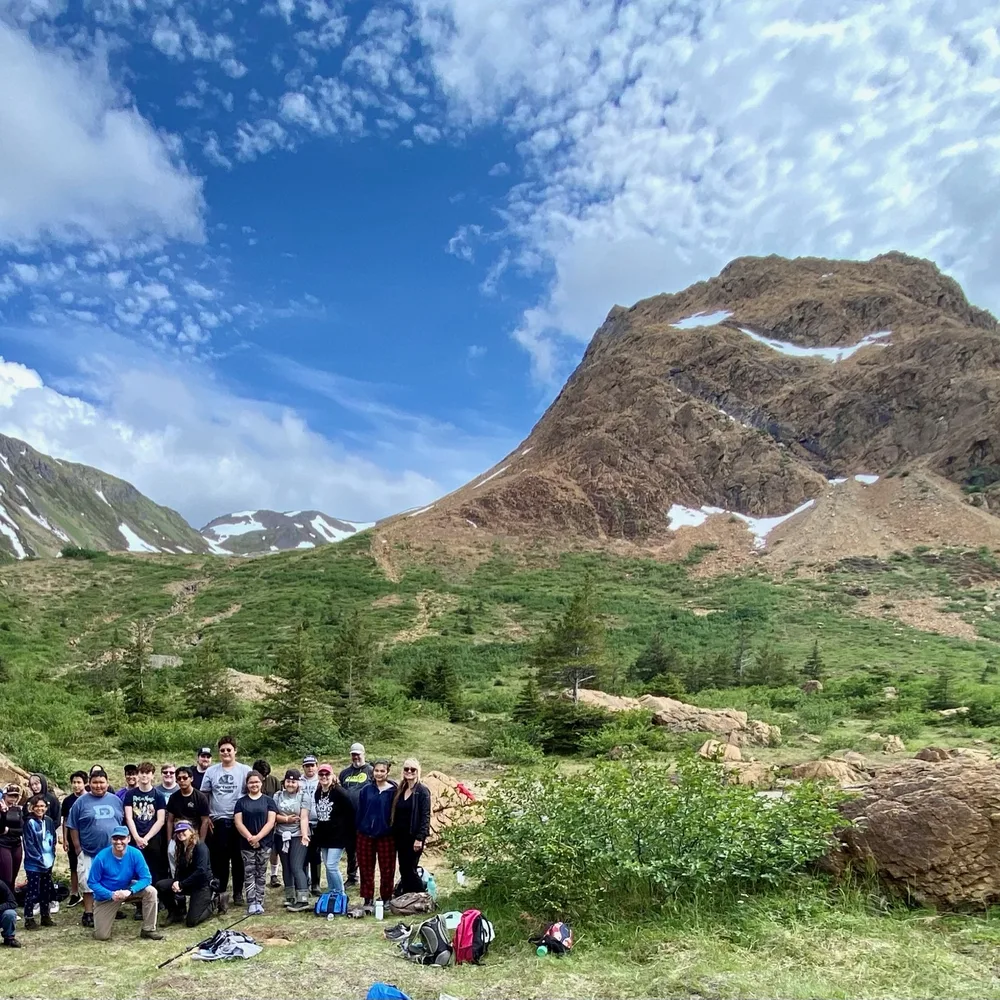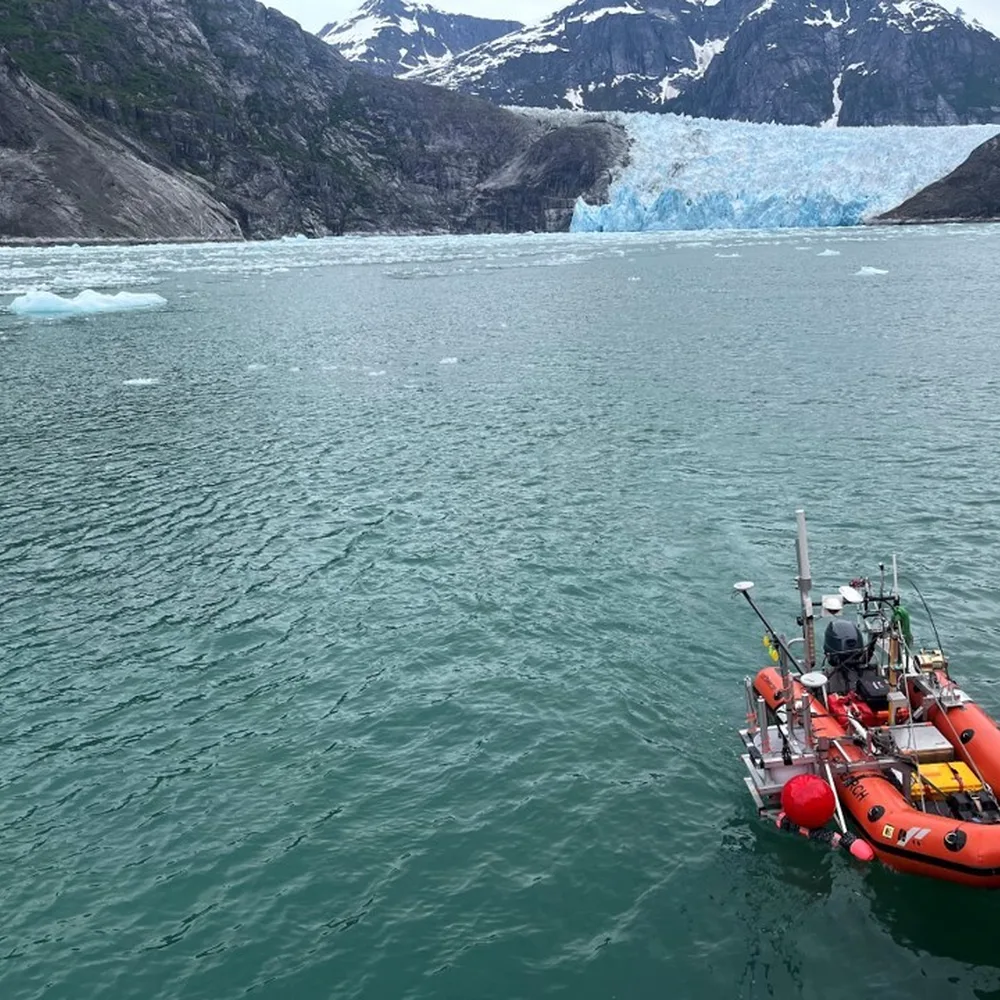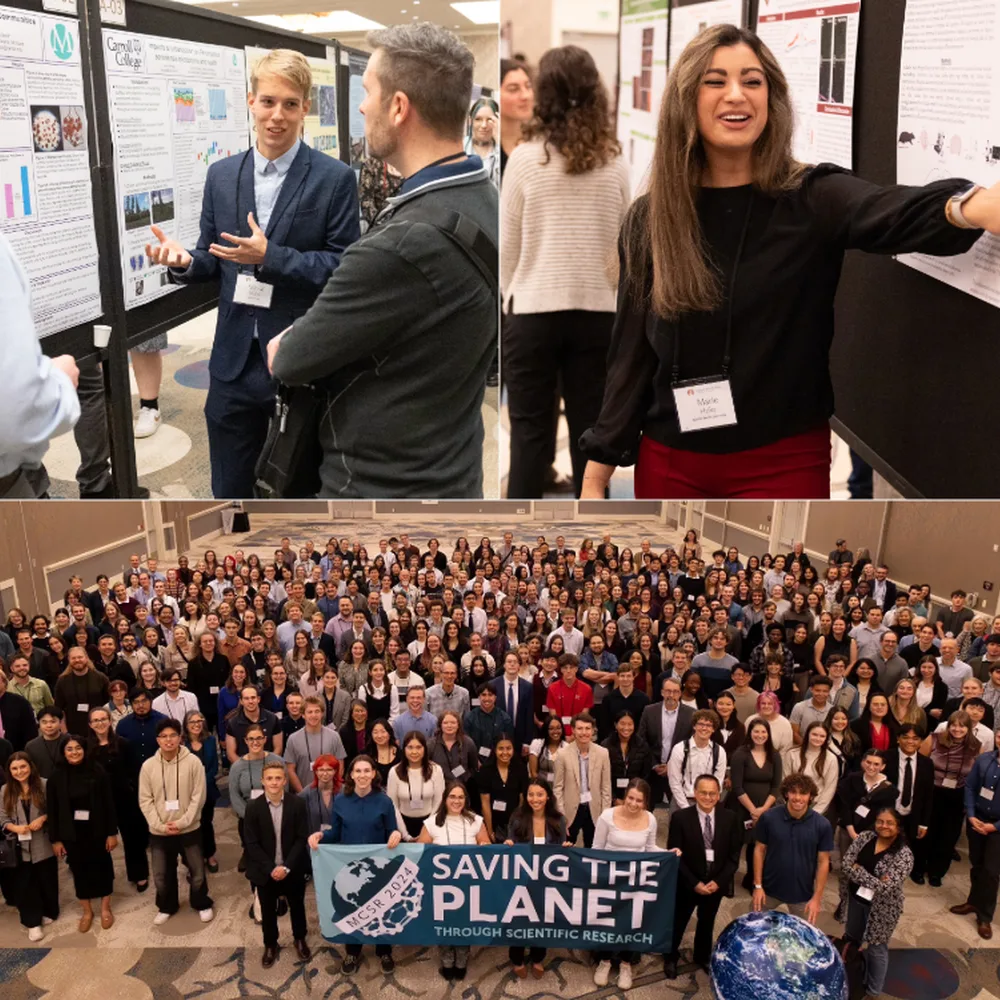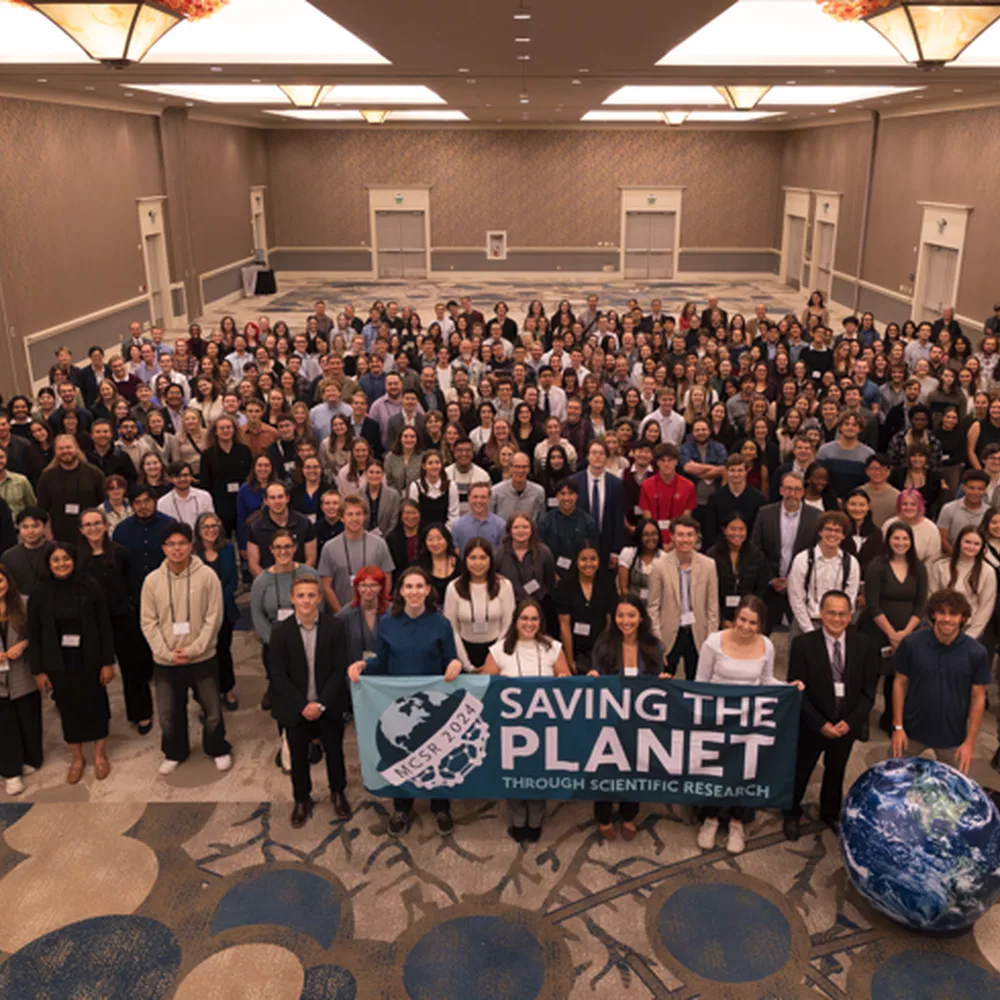2019 Lynwood W. Swanson Scientific Research Awards #
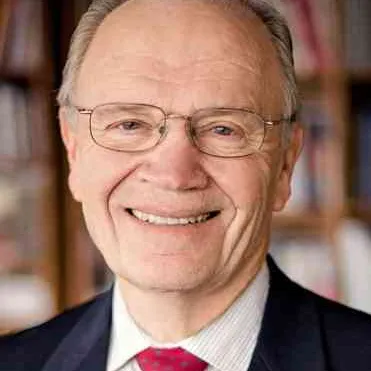
The M.J. Murdock Charitable Trust has announced the winners of its new annual scientific research awards at the 2019 MCSR Conference. The awards are open to invited nominations from private undergraduate institutions within the Pacific Northwest, encompassing Oregon, Washington, Idaho, Montana and Alaska. The “Swanson Award” is intended to recognize a senior faculty exemplar with an established, productive, and nationally recognized research program, while the “Swanson Promise Award” is aimed at recognizing a junior faculty who has demonstrated an exceptional potential in establishing an exemplary, productive, and sustainable research program. The latter award is intended to honor a junior professor with less than 10 years experience as a faculty member.
A panel of national experts evaluates the nominations, and the criteria for these awards are focused on research accomplishments that include the following.
- Discovery research accomplishments with national recognition
- Substantial engagement of undergraduate students
- Recognized leadership in developing and promoting research at undergraduate institutions
- Evidence of continuing growth in productive research
The awards honor the longtime work of Dr. Lynwood Swanson, who recently retired after serving as a Trustee at the Murdock Trust for 30 years. Dr. Swanson began his career as a professor at Linfield College, before moving his research to Oregon Graduate Institute. In 1971, he co-founded FEI, a world-leader in electron optics and focused ion beam technologies in scanning and transmission electron microscopies.
2019 Lynwood W. Swanson Scientific Research Award:
Dr. Dean Waldow, Professor of Chemistry, Pacific Lutheran University
“For exemplary research in polymer chemistry with applications to real-world challenges and as an inspiring mentor to scores of undergraduate students for over 25 years.”
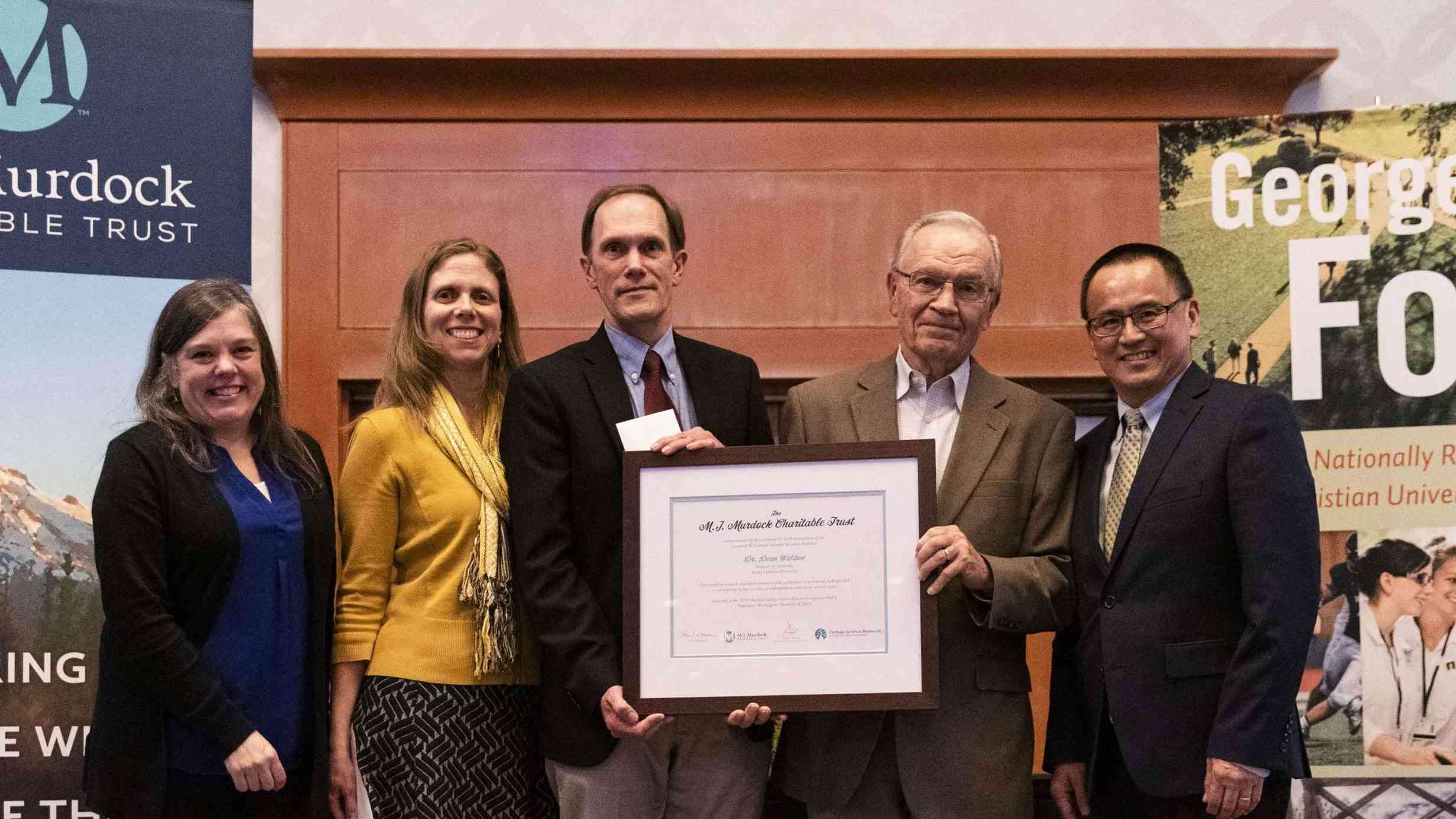
2019 Lynwood W. Swanson Promise for Scientific Research Award:
Dr. Alison Crocker, Assistant Professor of Physics, Reed College
“For researching the relationship between star formation and galaxy structure, and for directly involving undergraduate students in this work.”
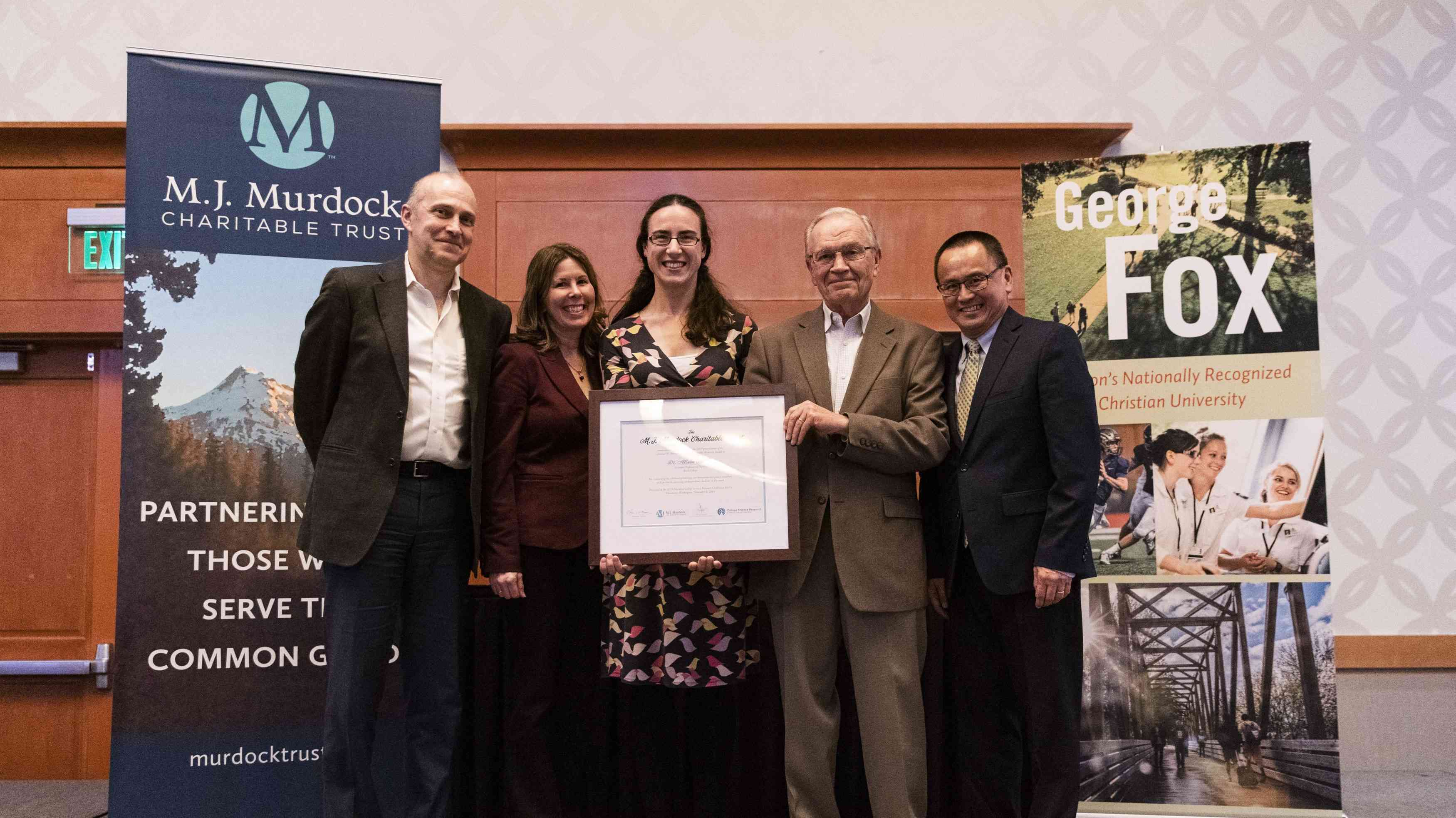
#
2019 John Van Zytveld Oral Presentation Awards #
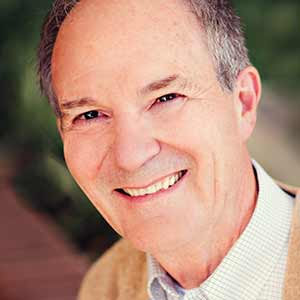
At each annual MCSR conference, students giving oral presentations compete for two awards: The John VanZytveld Physical sciences Award and The John VanZytveld Life sciences Award. The awards consist of a ribbon, a cash prize for the students and their academic departments, as well as a gift for their faculty research advisors. The criteria used by judges of faculty and students in selecting the awardees are as follows:
- Knowledge of material (understanding the background, research question, hypothesis, data collection and analysis, and limitation of the research)
- Creativity of the project
- Effective communication (clarity – slides and verbal presentation; organization; pace; answering questions)
- Level of preparation
- Ability to keep me interested
These awards are made in recognition of Dr. John Van Zytveld, a longtime Senior Program Director at the Murdock Trust and a champion for undergraduate research and science education in the region.
2019 John Van Zytveld Award In The Physical Sciences: Samartha Shrestha (presenter) & Christopher Roberts; Faculty mentor: Dr. Philip Measor
“A transparent UVA-1 biocompatible photoresin towards 3D printed lab-on-a-chip”
Whitworth University
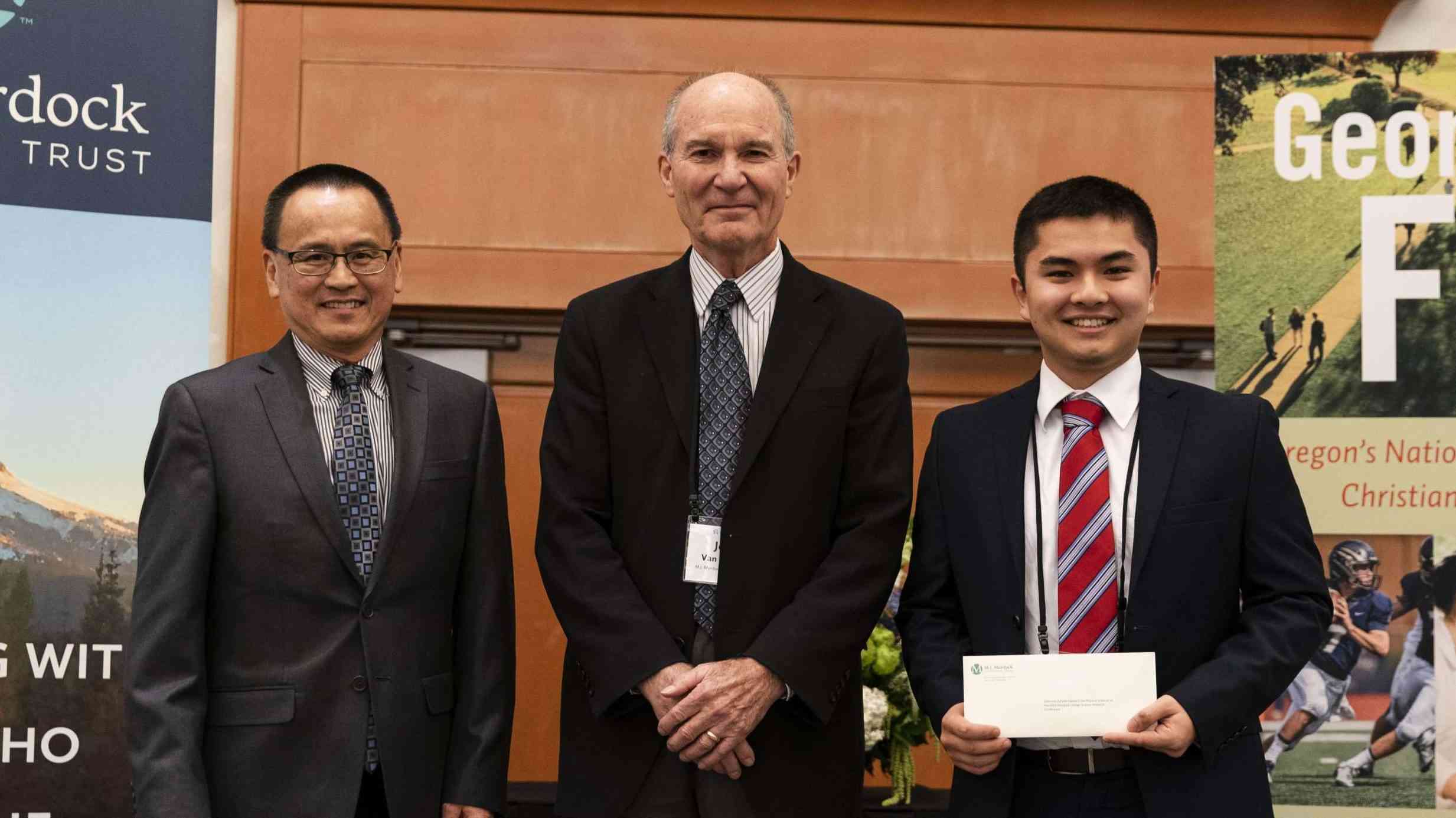
2019 John Van Zytveld Award In The Life Sciences: Will Brooks; Faculty mentor: Dr. Peter Wimberger
“Song recognition and hybridization in a new secondary contact zone of white-crowned sparrows, Zonotrichia leucophrys”
University of Puget Sound
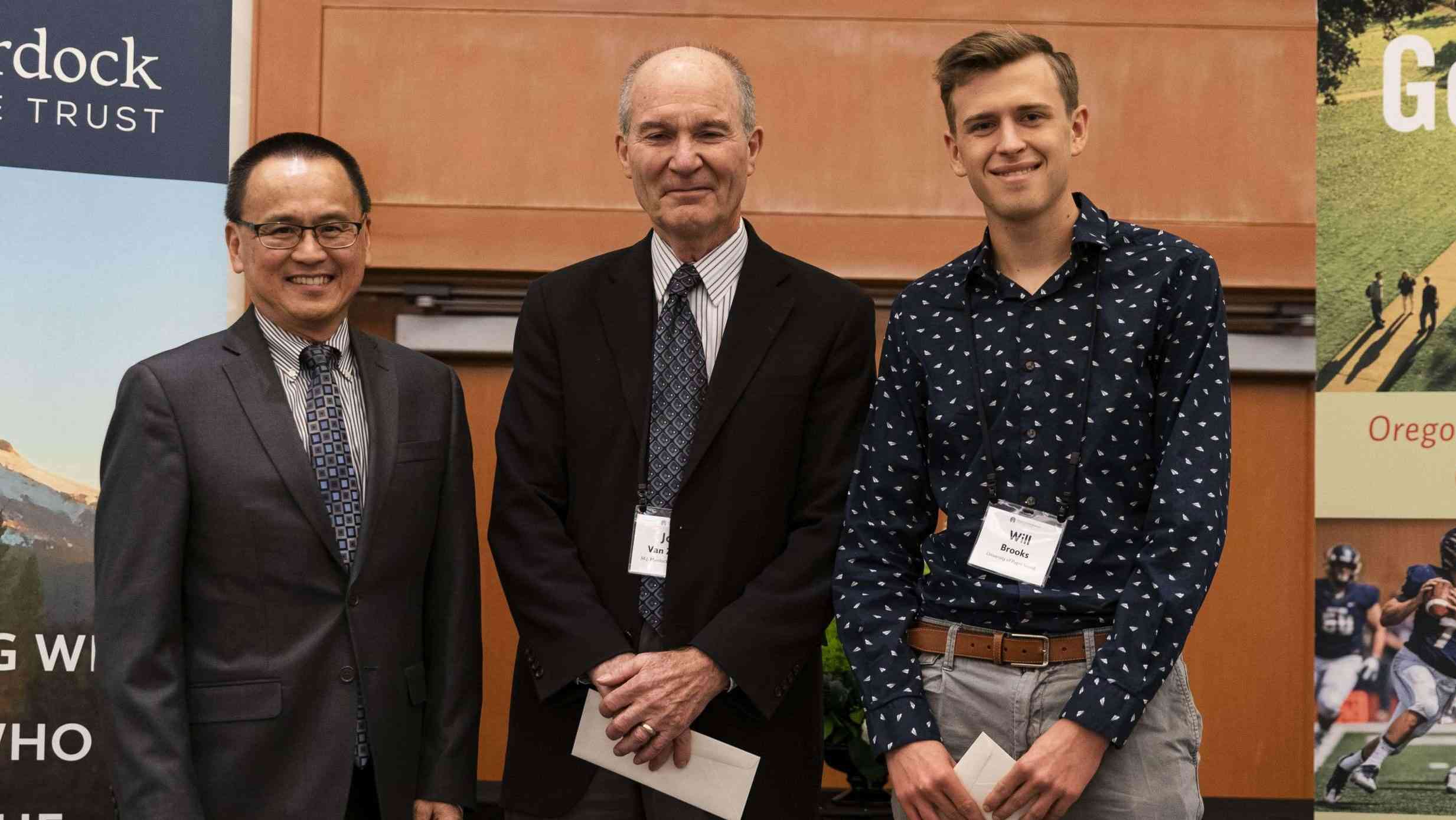
Murdock Poster Prizes #
Students presenting their research in a poster format are also recognized at each conference. One Murdock Poster Prize is presented to a poster in each research field, and it consists of a ribbon, a cash award and a gift for the faculty research advisor. The criteria used by faculty judges in selecting the awardees are as follows:
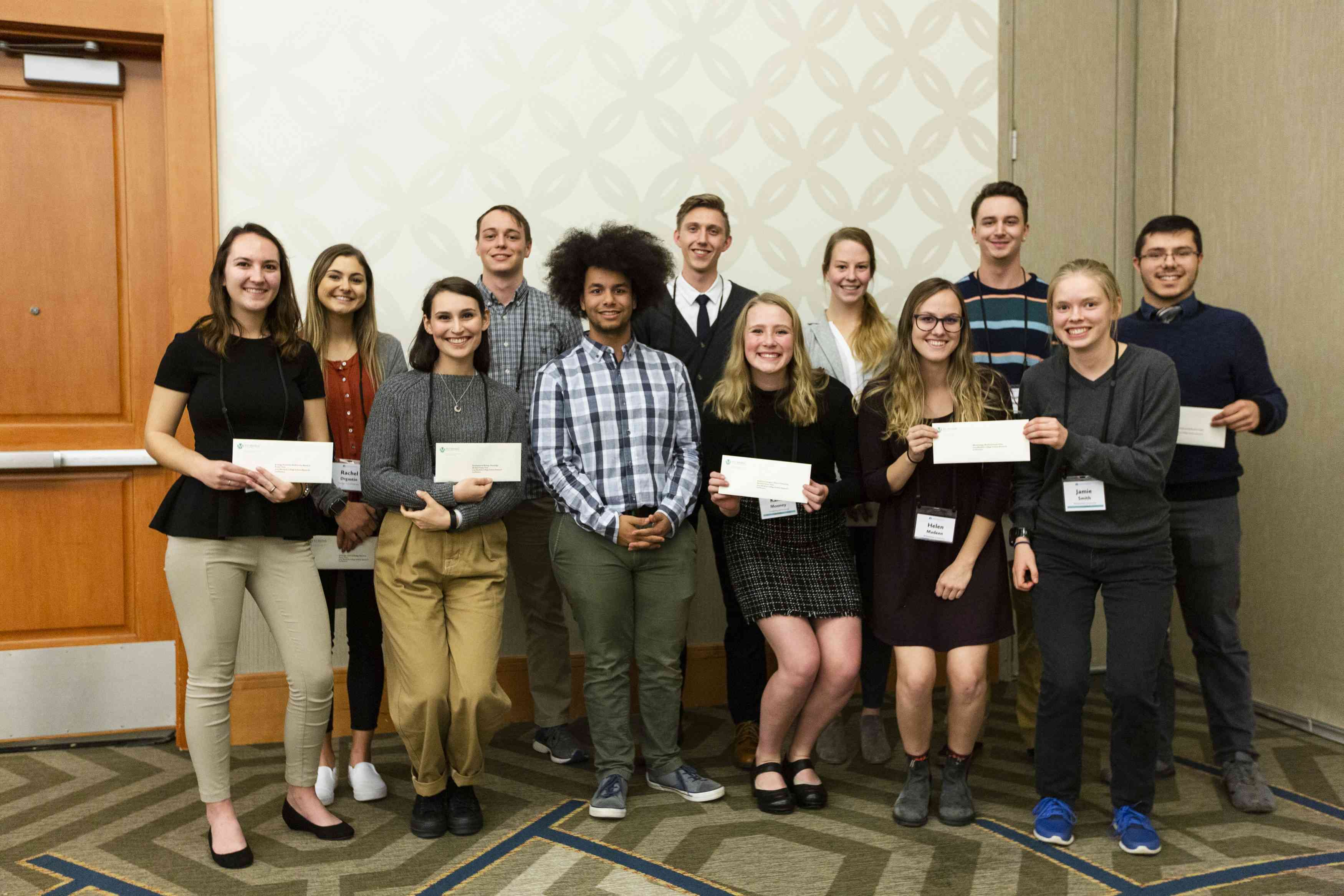
- Graphics relevance and visual impact
- Spelling and grammar
- Informational content
- Presentation content and research outcomes
- Presentation delivery
- Answering questions
- Overall presentation
A. Murdock Poster Prize in Ecology/Evolution/Biodiversity:
Kallan Richards (presenter) & Noah Cline
Faculty mentor: Dr. Cecilia Brothers
“Potential Factors Impacting the Severity of Seagrass Wasting Disease in the Salish Sea”
Walla Walla University
Kaela Hamilton
Faculty mentor: Dr. Carrie Woods
“Structural and spatial characteristics of Acer macrophyllum influence epiphyte communities in the Hoh temperate rainforest”
University of Puget Sound
B. Murdock Poster Prize in Developmental Biology/Physiology:
Pia Fornell
Faculty mentor: Dr. Laura Dyer
“Identifying How Sonic Hedgehog Signaling Affects Cardiac Neural Crest Migration Following Fetal Alcohol Exposure”
University of Portland
C. Murdock Poster Prize in Molecular Biology/Cell Biology:
Laney Search & Rachel Drgastin (co-presenters)
Faculty mentor: Dr. Matthew Stump
“Regulation of Functional hERG Isoform Expression by Poly(A) Binding Protein N1”
George Fox University
D. Murdock Poster Prize in Neuroscience/Psychology/Exercise Science:
Andrew Neumann
Faculty mentor: Dr. Jim Smart
“’The Role of Endolysosomal Trafficking protein Rab7A in DLX 5/6 Interneuron Development”
George Fox University
E. Murdock Poster Prize in Biochemistry:
James Bent
Faculty mentor: Dr. Jon Collins
“Quantitative NMR Analysis Reveals New Trends in Substrate Specificity of Benzoate Dioxygenase”
Whitman College
F. Murdock Poster Prize in Organic Chemistry:
Alan Brooke
Faculty mentor: Dr. Chadron Friesen
“A practical synthesis of fluorinated catechol derivatives using silver(I) fluoride”
Trinity Western University
G. Murdock Poster Prize in Analytical/Inorganic/Physical/Physical Organic/Computational Chemistry:
Kailin Mooney
Faculty mentor: Dr. Eugene Urnezius
“Physicochemical properties of 2,5-dihydroxy-1,4-quinones appended with phosphonato groups”
University of Portland
Jennica Kelm
Faculty mentor: Dr. Nadia Korovina
“Endothermic singlet fission in di-benzoic acid perylene oligomers”
Pacific Lutheran University
H. Murdock Poster Prize in Environmental Science/Geology:
Ethan Ducken
Faculty mentor: Dr. Chad Pritchard
“sUAV Mapping of the Porcupine Bay Road Landslide Complex”
Eastern Washington University
I. Murdock Poster Prize in Microbiology:
Helen Madeen (presenter), Cassie Cosler, Jamie Smith, Mayely Polanco, and Alexandra Bless
Faculty mentor: Dr. Rosa Leon Zayas
“Microbial community composition of Oregon marine sediment: In search of novel archaea”
Willamette University
J. Murdock Poster Prize in Physics:
Henrique Miller
Faculty mentor: Dr. Nathaniel Hicks
“PIC Simulations of Multipole Plasma Trap Diagnostics and Loading Methods”
University of Alaska Anchorage
2019 Neal Thorpe Memorial Lecture #
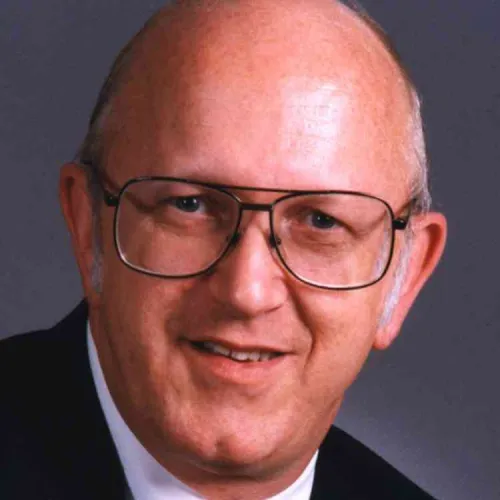
Dr. Michael P. Doyle, University of Texas at San Antonio
Title: “How to Gain Visibility with Undergraduate Research”
Biographical Sketch
Michael P. (Mike) Doyle, since 2014 the Rita and John Feik Distinguished University Chair in Medicinal Chemistry at the University of Texas at San Antonio, is a graduate of the College of St. Thomas and Iowa State University, has had prior academic appointments at undergraduate institutions (Hope College and Trinity University) and graduate universities (University of Arizona and University of Maryland), as well as being Vice President, then President, of a science foundation (Research Corporation).
Doyle has been called the “guru of undergraduate research” (Rebecca Rawls, “An Undergraduate Champion”, C&EN, Vol. 80, number 39, September 30, 2002, pg. 30-31) in recognition of his role in developing student careers in the chemical sciences through research and being an outspoken champion of research as an educational enterprise. More than 170 undergraduate students are coauthors of at least one publication with him, and there are several with five or more publications. The list of his undergraduate coauthors constitutes a virtual who’s who in organic and inorganic academic chemistry today. He was one of the founders of the Council on Undergraduate Research (http://www.cur.org/), its first president (1978), and the Editor of its newsletter; and he was also the first Chairman (1987) for the Executive Committee of the National Conferences on Undergraduate Research (NCUR) that merged with CUR in 2011.
At Maryland he was Chair of the Department of Chemistry and Biochemistry for ten years, during which time he led his department to be a recognized center for diversity in the preparation of underrepresented minorities for the Ph.D. degree in chemistry and biochemistry (Lauren K. Wolf, “Blueprint for Boosting Diversity”, C&EN, Vol. 89, issue 51, December 19, 2011, pg. 41-42); in 2011 he received the Presidential Award for Outstanding Partner in Academia from the National Organization for the Professional Development of Black Chemists and Chemical Engineers (NOBCChE).
The author of nearly 400 peer-reviewed publications, 11 books, 11 patents, and 25 book chapters, Doyle is the recipient of the 1988 American Chemical Society (ACS) Award for Research at an Undergraduate Institution, the 1995 James Flack Norris Award for Outstanding Achievements in the Teaching of Chemistry sponsored by the Northeastern Section of the ACS and the 2002 George C. Pimentel Award in Chemical Education from the ACS. He is a Fellow of the American Chemical Society, the American Association for the Advancement of Science, and the Royal Society of Chemistry, and he is the recipient of numerous awards for his research, including the 2014 Hillebrand Award from the Chemical Society of Washington, a 2006 Arthur C. Cope Senior Scholar Award from the American Chemical Society, and a 2003 Merit Award from the National Institutes of Health.
Graduate School & Vendor Exhibition Participants #
Bruker
Central Washington University
Eastern Washington University
Luminex Corporation
Pacific University, School of Pharmacy, College of Optomotry
University of British Columbia
University of Idaho
University of Montana
University of Oregon
Walla Walla University
Washington State University, Elson S. Floyd College of Medicine, NIH Biotech Training Program, College of Pharmacy and Pharmaceutical Sciences, Doctoral of Pharmacy Program, Washington State University Vancouver
Faculty Enrichment Workshop #
Participating faculty were given time to continue to explore collaborative research ideas, network with colleagues from other institutions, ask questions, and hear from a panel of colleagues who have participated in one of the piloted collaborative research alliances. Learning from the piloted programs have led to the RAISE initiative.

